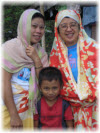Bismillah (In The Name Of God)
By: Violeta Villaraiz
Violie had an article in Misyon before about her experience as an Assumption Volunteer in Cameroon. She went to Korea in April as a Columban lay missionary.

With the help of our host, Bishop Edwin de la Peña MSP of the Prelature of Marawi, his assistant, Fr Chito Suganob, and the MARADECA (Maranao People Development Center) staff, we were able to live for four days with a Maranao family in Bayabong, Butig, Lanao del Sur.
‘BISMILLAH’ – ‘in the name of God’. Yes we both were uttering God’s name. So, what is the difference? Having set foot in Marawi was for me an experience of walking on sacred ground. I felt oneness with the Maranaos, for I was given this chance to meet them in person. I also felt my being a stranger and yet welcomed by their smiles. Each time I greeted them with ‘Assalome Allaikom! - ‘Peace be with you!’ It was with the same peace of the same God we worship to be responded to with ‘Alaikom Salam!’ – ‘and so with you!’ Each time I greeted them and received a response, I really felt the connection we have for each other, that we have only one God.
‘BISMILLAH’ – ‘in the name of God’, means for the Maranaos entrusting everything to God before doing anything. I too began to utter this during our stay. I reminded myself to make the Sign of the Cross in my mind. I found myself just placing my hand gently over my heart. I experienced being part of a minority and asking myself questions about my own faith. I noticed how the family we stayed with were very faithful in their prayer – five times a day. I felt the challenge to check how I was relating with them. It wasn’t really that hard, for they and we were true to ourselves in relating to one another, respecting one another’s beliefs. We shared life, we laughed together, we talked of life, questioning and answering anything about ourselves. We even talked about politics. We were aware of the reality that we had different points of view, but we listened to one another and heard one another. The family shared with us how they were once victims of Muslim-Christian conflict, especially the all-out war of the government of President Estrada in 2000. We ate together and were overwhelmed by the family’s hospitality. We enjoyed the ride to the Malaeg River and passed by ‘Palestine’, the training camp of the MILF. Did I fear these? Of course . . . but as I had lived in Fort Bonifacio, Makati, since 1973 it was like being in the presence of the army.
Leaving behind all the biases and prejudices I carried helped me to savor the moments of each encounter, of each day of just sharing life with Muslims. And we found peace in that . . . just feeling the presence of one another, without any barriers of religion, faith or ideology. BISMILLAH!!!
‘ALHAMDULILLAH’ – ‘Salamat sa Diyos!’ - ‘Thank God!’ ‘Prejudice is the fruit of ignorance’. If we only knew the facts then we wouldn’t be biased! However, prejudice is not simply about the lack of access to the facts. Sometimes, even when we are presented with all the facts, we still refuse to accept them because we feel more secure in our prejudices. We are largely unaware (ignorant) of the historical and psychological factors that give rise to our prejudices. A session with Fr Paul Glynn SSC on prejudices and biases before going to Marawi helped me to realize the truth of what he told us, that prejudice is always unreasonable and irrational, it is never based on real experiences. And my experience in Marawi was one of sharing the dialogue of life. The only thing that mattered to me, and I’m sure to the family we stayed with, even for such a short time, wasn’t the quantity but the quality of life we shared with one another.
You may contact the author at violetavillaraiz@yahoo.com or write her at: St Columban’s Lay Missionary Center, CPO Box 1167, SEOUL 100-611, REPUBLIC OF KOREA
‘WE HAVE ONLY ONE GOD’

The Catechism of the Catholic Church, No 839, describes the Church’s relationship with the Jews in this way: ‘When she delves into her own mystery, the Church, the People of God in the New Covenant, discovers her link with the Jewish People, “the first to hear the Word of God.” The Jewish faith, unlike other non-Christian religions, is already a response to God’s revelation in the Old Covenant. To the Jews “belong the sonship, the glory, the covenants, the giving of the law, the worship, and the promises; to them belong the patriarchs, and of their race, according to the flesh, is the Christ”, “for the gifts and the call of God are irrevocable”’.
In No 841 the Catechism speaks of Islam: ‘The plan of salvation also includes those who acknowledge the Creator, in the first place amongst whom are the Muslims; these profess to hold the faith of Abraham, and together with us they adore the one, merciful God, mankind’s judge on the last day’.
Jews, Christians and Muslims all believe in one God. The Jews still await the Messiah, Muslims honor Jesus as a prophet but Christians believe that he is the Messiah, God who became Man, was crucified on Good Friday and rose from the dead on Easter Sunday. Christians believe that God is Three Persons, the Blessed Trinity, the Father, Son and Holy Spirit. Jews and Muslims do not believe that Jesus is God who became Man nor do they believe in a Trinitarian God.
As children of Abraham we believe in one God, the Creator of all. But the Christian understanding of God is very different from that of Jews and Muslims.

